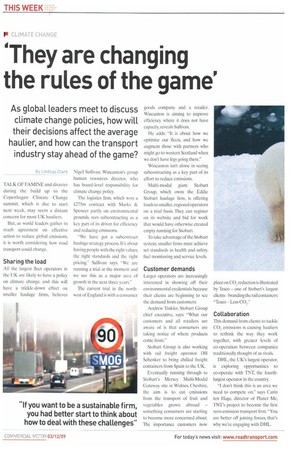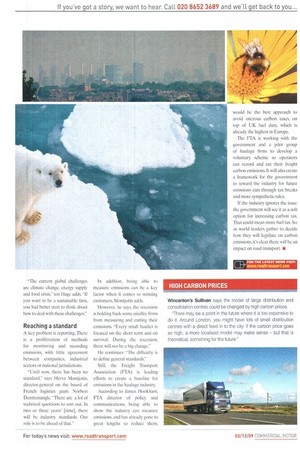P CLIMA1 E CHANGE
Page 16

Page 17

If you've noticed an error in this article please click here to report it so we can fix it.
'They are changing the rules of the game'
As global leaders meet to discuss climate change policies, how will their decisions affect the average haulier, and how can the transport industry stay ahead of the game?
By Lindsay Clark TALK OF FAMINE and disaster during the build up to the Copenhagen Climate Change summit, which is due to start next week, may seem a distant concern for most UK hauliers.
But, as world leaders gather to reach agreement on effective action to reduce global emissions, it is worth considering how road transport could change.
Sharing the load
All the largest fleet operators in the UK are likely to have a policy on climate change, and this will have a trickle-down effect on smaller haulage firms, believes Nigel Sullivan, Wincan ton's group human resources director, who has board-level responsibility for climate change policy
The logistics firm, which won a £275m contract with Marks Sr. Spencer partly on environmental grounds, sees subcontracting as a key part of its driver for efficiency and reducing emissions.
"We have got a subcontract haulage strategy process. Its about having people with the right values, the right standards and the right pricing." Sullivan says, "We are running a trial at the moment and we see this as a major area of growth in the next three years."
The current trial in the northwest of England is with a consumer goods company and a retailer. Wincanton is aiming to improve efficiency where it does not have capacity. reveals Sullivan.
He adds: "It is about how we optimise our fleets, and how we augment those with partners who might go to western Scotland when we don't have legs going there," Wincanton isn't alone in seeing subcontracting as a key part of its effort to reduce emissions Multi-modal giant Stobart Group, which owns the Eddie Stobart haulage firm, is offering loads to smaller, regional operators on a trial basis. They can register on its website and bid for work that would have otherwise created empty running for Stobart.
lb take advantage of the Stobart system, smaller firms must achieve set standards in health and safety fuel monitoring and service levels.
Customer demands
Larger operators are increasingly interested in showing off their environmental credentials because their clients are beginning to see the demand from customers.
Andrew linkler, Stobart Group chief executive, says: "What our customers and all retailers are aware of is that consumers are taking notice of where products come from."
Stobart Group is also working with rail freight operator DB Schenker to bring chilled freight containers from Spain to the UK.
Eventually running through to Stobart's Mersey Multi-Modal Gateway site in Widnes, Cheshire, the aim is to cut emissions from the transport of fruit and vegetables grown abroad — something consumers are starting to become more concerned about. The importance customers now
place on CO, reduction is illustrated by Tescc-) — one of Stobart's largest clients— branding the rail containers: "Tesco — Less CO,."
Collaboration
This demand from clients to tackle CO, emissions is causing hauliers to rethink the way they work together, with greater levels of co-operation between companies traditionally thought of as rivals.
DHL, the UK's largest operator, is exploring opportunities to co-operate with TNT, the fourthlargest operator in the country.
"I don't think this is an area we need to compete on," says Carin ten Hage, director of Planet Me. TNT's project to become the first zero-emission transport firm. "You are better off joining forces, that's why we're engaging with DHL.
"The current global challenges are climate change, energy supply and food crisis," ten I lage adds. "If you want to be a sustainable firm, you had better start to think about how to deal with these challenges."
Reaching a standard
A key problem is reporting. There is a proliferation of methods for monitoring and recording emissions, with little agreement between companies, industrial sectors or national jurisdictions.
"Until now, there has been no standard," says Herve Montjotin, director-general on the board of French logistics giant Norbert Dentressangle. "There are a lot of technical questions to sort out. In two or three years' [time], there will be industry standards. Our role is to be ahead of that." In addition, being able to measure emissions can he a key factor when it comes to winning customers, Montjotin adds.
However, he says, the recession is holding back some smaller firms from measuring and cutting their emissions. "Every small haulier is focused on the short term and on survival. During the recession, there will not be a big change."
He continues: "The difficulty is to define general standards."
Still, the Freight Transport Association (ETA) is leading efforts to create a baseline for emissions in the haulage industry.
According to James Hookham, ETA director of policy and communications, being able to show the industry can measure emissions, and has already gone to great lengths to reduce them, would be the best approach to avoid onerous carbon taxes, on top of UK fuel duty, which is already the highest in Europe.
The ETA is working with the government and a pilot group of haulage firms to develop a voluntary scheme so operators can record and cut their freight carbon emissions. It will also create a framework for the government to reward the industry for future emissions cuts through tax breaks and more sympathetic rules.
If the industry ignores the issue. the government will see it as a soft option for increasing carbon tax. That could mean more fuel tax. So as world leaders gather to decide how they will legislate on carbon emissions, it's clear there will be an impact on road transport. •














































































































































